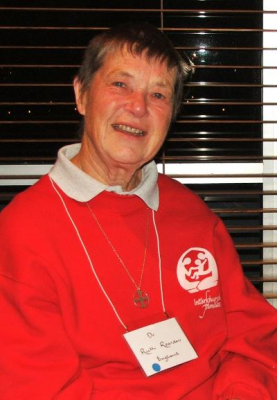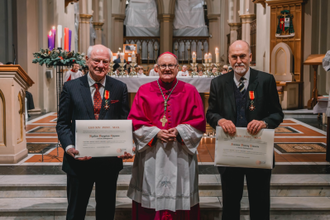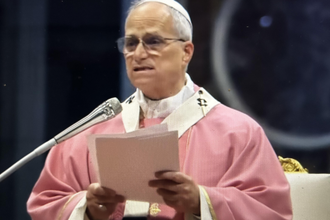Tribute to Ruth Reardon 1930 - 2022

Ruth Reardon
Ruth Reardon, a Catholic theologian and ecumenist, died recently at the age of 92. This tribute is written by Paul Docherty of the Association of Interchurch Families (AIF), of which Ruth was a co-founder.
Like most of us, Ruth fulfilled many roles - as a beloved family member, friend, mentor and colleague as well as being involved with her churches, her community, ecumenical bodies and various publications. In the short time available today I cannot do justice to all these roles so, drawing on Ruth's own writings and contributions from members of the Association of Interchurch Families (AIF) and friends, I want to focus on what became the central purpose of Ruth's life and through which she lived out all of these roles. I refer, of course, to the passion that she shared with Martin for Christian Unity, symbolised in the Rublev icon which was always at the centre of their family life with Sarah and John; a constant reminder of God's encircling love.
Born into a devout Baptist home in 1930, she first wanted to be a missionary in Africa and by 21 was playing a role in national Church life by representing Baptist students at the 1st Conference of British Youth. Five years later she became a Roman Catholic after meeting Fr John Coventry, a Jesuit, who had addressed the Student Christian Movement at her college. By the following year she was working in Belgium and later enrolled on a course of Religious Studies at Louvain university where she lived with other international students in the home of two keen ecumenists.
After she had been there a year an Anglican priest, Martin Reardon, arrived to study at Louvain and over the coming months they spent time together talking and praying. But then, Ruth wrote "... as we were preparing a service for the Week of Prayer for Christian Unity in 1961, we realised we were in love. It was a terrible shock. We were dismayed. Falling in love" she added "is always a gift, but in this case, it was hardly a welcome one".
The cause of their dismay was of course the fact that mixed marriages were strongly discouraged and seen, even by committed ecumenists, as a problem. However, with this dawning of their love for each other the seeds of what would become their mission in life began to take root as they grappled with the theological possibilities that marriage between Christians of different communions might contribute to the understanding and healing of ancient divisions.
After three years of discernment, Martin was unexpectedly given a dispensation by the Archbishop of Brussels, Cardinal Suenens, who had decided that he did not need to promise to bring up the children of the marriage as Roman Catholics. This allowed Ruth and Martin to be married in Belgium in a ceremony in which both Catholic and Anglican priests took part - an impossibility in England in 1964. At their wedding Ruth's ring had the words "That they may be One" engraved inside - whilst in Martin's was written "That the world may believe".
Back in England, Ruth and Martin were well-placed to support couples who faced similar issues to them in their marriages. In early 1968 they arranged a small meeting for such couples in their home in Sheffield, followed by a successful national meeting in November where Fr John Coventry, now the Secretary of the Catholic Ecumenical Commission for England and Wales, said: "They're so pleased to meet one another - we must do this again." Thus was the Association of Interchurch Families (AIF) born, and Ruth's personal experience of ecumenism grew into a much broader and lifelong purpose in the cause of Christian Unity. One of the association's members once described Ruth's commitment as being like that of someone who had founded a religious order - and in some senses that is indeed perhaps how she saw AIF.
There will be time to talk of Ruth's many achievements at future events - but for now, suffice to say that for many years she managed the new organisation, and until very recently she was both a theologian for, and a caring pastor to, interchurch couples. With her formidable intellect, she would read the Roman Catholic Church's documents with an astute eye and pick out the nuances that favoured both ecumenism and the lived reality of being an interchurch couple - a reality that she understood so well because of her interest in, and care for, couples who sought support from the association. Always aware of the bigger picture (including the international dimension of being an interchurch family) she showed couples how to gently persuade the hierarchy without antagonising them. Indeed, she was highly regarded by the Roman Catholic Bishops' Conference and well known to the Pontifical Council for Christian Unity in Rome.
Throughout her life, Ruth contributed extensively to ecumenical journals; she was co-editor of 'One in Christ' during and after Vatican II and edited a regular journal for Interchurch Families from 1993 till 2009. Her final article, published last year in response to the Vatican document 'The Bishop and Christian Unity: an Ecumenical Vademecum', pointed out a change of language coming from Rome, and she quoted three examples of the Church listening to interchurch families - a change for which she and Martin can take at least some of the credit. In spite of continuing restrictions on sharing communion, the article is full of optimism for the future.
First Martin, then Ruth, had hoped to write a book on unity from the perspective of interchurch families. It was not to be, but I believe that Ruth has given us a gift far more precious than words on a page - she gave us the example of a life of faithful service and pastoral care in which unity was at the heart of everything that she did. Her life, and our memories of that life, have a much greater power to witness to the vision of unity expressed in Jesus's prayer in John 17, and which was inscribed in Ruth and Martin's wedding rings, than any book could ever do.
Working closely with Ruth as chair of AIF I know that she was aware that this day was fast approaching, and I close with her own words, written two years after Martin's death: "Marriage is for this world, but the love and unity between us is a participation in God's own love and is therefore eternal. One day I too will be called to the fuller knowledge of that love in our Father's house."
Ruth has now been called to that fuller knowledge and we give thanks that our knowledge of her, and her love for us, has enriched us all in this life. May she rest in peace.















